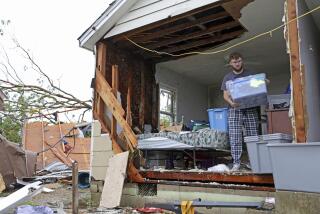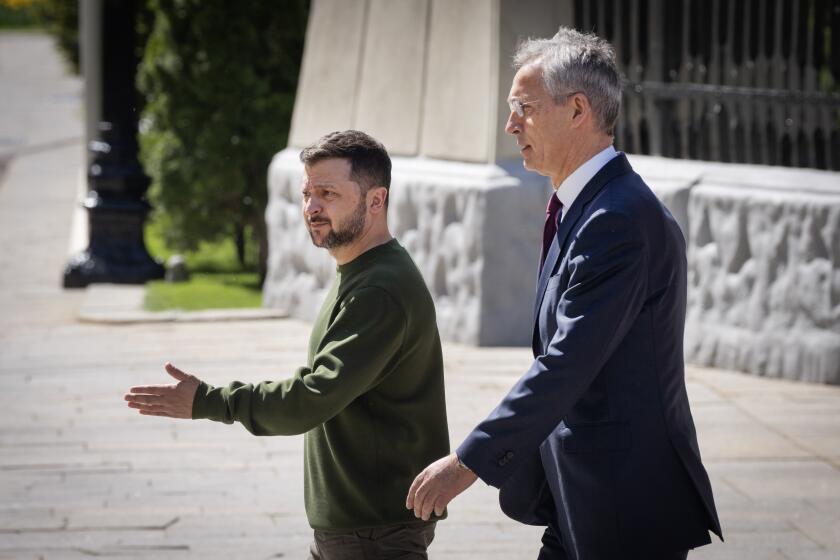Mexico’s Migrant Policy Called a Harsher Prop. 187 : Latin America: Critics charge castigating California is hypocritical. Government says it is reviewing problem.
They call them los indocumentados . They work in boiler-room factories, sweatshops and street markets in the capital, or scrape a living in the fields of rich ranchers in the south, barely surviving on wages far below the legal minimum.
They hide from immigration authorities, and many live in fear, moving often from shanty to shanty. They are victimized by: corrupt business people; local officials; police; smugglers known as “coyotes” who bring them over the border for a fee, and even border guards who are supposed to keep them out.
And every year, Mexico quietly deports thousands of them, illegal immigrants from Guatemala, Honduras, El Salvador and other Central American nations who have penetrated its porous southern border in search of a better life in the North.
Sound ironic? All too familiar, perhaps? It is a flip side of Proposition 187 and tops the list of Mexico’s most sensitive foreign policy issues. Especially now.
Against the backdrop of Mexico’s torrent of criticism of the California initiative--crowned by President Ernesto Zedillo’s resounding condemnation a week ago at the Summit of the Americas of Proposition 187 as a violation of Mexican human rights--critics here have charged hypocrisy.
Mexico’s immigration laws, they say, are even stricter and their enforcement far harsher than California’s initiative to deny public services to undocumented immigrants.
“There is a double standard here,” said Luis Gonzalez Souza, a social sciences professor at Mexico City’s National Autonomous University of Mexico and author of two books on U.S.-Mexican relations. “We are not respecting the human rights of these undocumented immigrants in the same way we are demanding the U.S. respect the human rights of Mexicans. We are losing credibility, and we are losing the negotiating power to demand such rights for Mexicans in the U.S.”
Senior government officials concede that their strict immigration policies have left them open to criticism and quandaries. They confirmed Friday that Zedillo has created a high-level committee to conduct a sweeping review and overhaul of Mexico’s immigration policies and enforcement. “We understand we have a problem. We accept we have a problem, and we are trying very thoroughly to solve these problems,” one senior official said.
But those officials also stressed that the issue goes deeper. Many of the undocumented immigrants are merely crossing Mexico toward the U.S. border, they said, and the Mexican government actually has been forced to do the job of U.S. immigration authorities by “turning the U.S. border downward.”
Yet even those officials acknowledged that Mexico’s harsh immigration policy has a domestic dimension. It is based on intense competition for jobs in a nation with soaring unemployment and crushing poverty of its own: Most of the undocumented Central Americans never make it to the U.S. border. Others never intended to. In both cases, officials here said, migrants believe they can find a better life in Mexico than at home.
In Mexico, the immigration issue remains so sensitive that no government official would speak on the record about it. It is so sensitive that the government has declared all statistics on deportations or detentions of undocumented Central Americans--data on the tens or perhaps hundreds of thousands of illegal immigrants--off limits to the public.
According to figures that are available, the magnitude of the illegal immigration problem pales in comparison with that in the United States.
The National Institute of Migration, a quasi-official body, reported last Monday, in figures later denied as unofficial by immigration authorities, that Mexico expelled 3,651 undocumented immigrants, 40% of them Guatemalan, in the first 11 months of this year; the United States, in contrast, deported about 1 million Mexicans and others during the same period.
But that number is grossly low, said the dozens of human rights groups and non-governmental agencies that have worked for years to help undocumented migrants in Mexico.
“I think the Mexican authorities have been coloring the real figures because they don’t want to expose the dimension of the issue,” Gonzalez said. “I’m afraid this is one of the issues in which we have to start from the beginning in determining just how high the numbers really are.”
Raul Macin, whose Center for the Coordination of Ecumenical Projects has four support centers for illegal immigrants in rural Mexico, agreed.
“There are many undocumenteds in Mexico who theoretically don’t exist,” Macin said. “There are many ways to be undocumented in Mexico, because the official policy is very ambiguous. And I think it is intentionally ambiguous. We cannot have an idea of the magnitude of the problem, but it is serious. And the flow is increasing.”
For example, Macin said, Mexico’s immigration laws permit Salvadorans to obtain visas that are valid only as far north as Mexico City. When they go north of the capital, they become illegal. Other Central American migrants are given visas that bar them from working. If they try to earn a living, they become illegal.
To further illustrate the ambiguity in the numbers, Macin cited the large population of Guatemalans in Mexico. The government estimates it at 40,000, he said. But the Roman Catholic archdiocese in the southern Mexican town of San Cristobal de las Casas, which deals with the Guatemalan community daily, puts the number at 200,000.
Throughout most of the 20th Century, Mexico has been a haven for immigrants and refugees. It admitted tens of thousands of Spaniards during the Spanish Civil War. Thousands of Cubans fleeing the Communist regime have established new homes and new lives here. And, until it reached saturation in the early 1980s, Mexico threw its doors wide open to its troubled Central American neighbors, bringing hundreds of thousands of undocumented immigrants fleeing the many civil wars to the south.
Most of the migrants were political refugees from repressive regimes in Guatemala, El Salvador and Honduras.
Now, Macin and other human-rights workers said, the undocumented immigrants are mostly economic refugees--a condition all too familiar to U.S. policy-makers.
“I have seen such things that even I cannot believe at first,” Macin said of his many visits to Mexico City’s Ciudad Neza, a neighborhood of crushing poverty that is known to house a large number of illegal immigrants.
“I have seen in Ciudad Neza places where two or three families live in one room,” he said. “And I have asked them, ‘To live like this, you have left your country?’ They say: ‘Here, I have this--a place to sleep, a roof over my head. There, we didn’t even have this.’ It’s not a life we would perceive as better, but for them it is. And that’s what makes the risks of being an illegal immigrant here worth it.
“There is this saying I often hear when we ask them, ‘What are you looking for?’ ” Macin said. “They all say, ‘We’re looking for life.’ They’re looking for a road to survival.”
But the risks along that road are profound, Macin and others said. Routinely, they said, border guards and the “coyotes” rob the migrants before allowing them to pass or turning them back.
“The biggest risk is to fall into the hands of the authorities, who are totally and absolutely corrupt,” Macin said. “The corruption is from the top down. They can be arbitrarily detained and their possessions stolen. Invariably . . . everything of value is taken. They are vulnerable, and if they don’t have someone to help them, they can be deported.”
It is just such corruption that Mexico’s new president has vowed to end. Zedillo has appointed an opposition party member as attorney general, the office that enforces Mexican immigration laws at the border and throughout the country. And the chief prosecutor’s principal task, Zedillo vowed, will be to root out bad agents and create “a new rule of law” in a society plagued by corruption.
In addition, besides harshly criticizing Proposition 187 in Miami, the president called on all nations of the Americas to formulate a comprehensive, humane immigration policy to restore justice to a system overwhelmed by people and poverty.
But for those most affected here, the immigration nightmare looms as large as it does for the undocumented Mexicans in California who feel threatened by Proposition 187.
Mercedes Ramirez knows. She is secretary general of the 19th of September Seamstress Union, named for the date of the 1985 earthquake that racked Mexico City and crushed 3,000 seamstresses to death in illegal sweatshops throughout the capital.
Ramirez tried several times to arrange interviews with undocumented immigrants. They never showed up. “There is a lot of fear,” she said. “Their lives are synonymous with fear. Usually a long time passes before someone like this will tell you where they’re from, even after you get to know them very well. They’re just afraid of everyone.”
Consider the two Guatemalan migrants her union discovered living as prisoners in a sweatshop. “They had no papers allowing them to work, so the padron (owner) of the factory told them: ‘You can work here, but you can never leave. They’ll catch you and send you back to Guatemala,’ ” she recalled.
In another case, Ramirez said she learned only after years of dealing with him that one of her contacts in the Mexican Labor Ministry was an illegal. One day, she said, he finally admitted he was from Guatemala, illegally in Mexico, but had managed to get his job by buying falsified immigration papers. “Here in Mexico,” she said, “one can get any papers one wants for a price.”
The dilemma for most, though, is that they cannot afford the documents. “I think the majority of them do want to go to the United States,” Ramirez said. “But by the time they get here, their money is gone--stolen or spent. So they have to stay here to make some money to continue the journey. And many get stuck here for a very long time.
“Those who cannot afford documents for a real job,” she said, “are forced to find work in the underground--informal or illegal markets or factories. That means exploitation. That means fear. And that becomes their lives.”
More on Immigration
* “The Melding Americas,” a special issue of World Report, looks at the economic, cultural and political issues surrounding the large-scale migration of Central and South Americans to the United States. It’s available on the TimesLink on-line service.
Details on Times electronic services, A10
More to Read
Start your day right
Sign up for Essential California for news, features and recommendations from the L.A. Times and beyond in your inbox six days a week.
You may occasionally receive promotional content from the Los Angeles Times.






